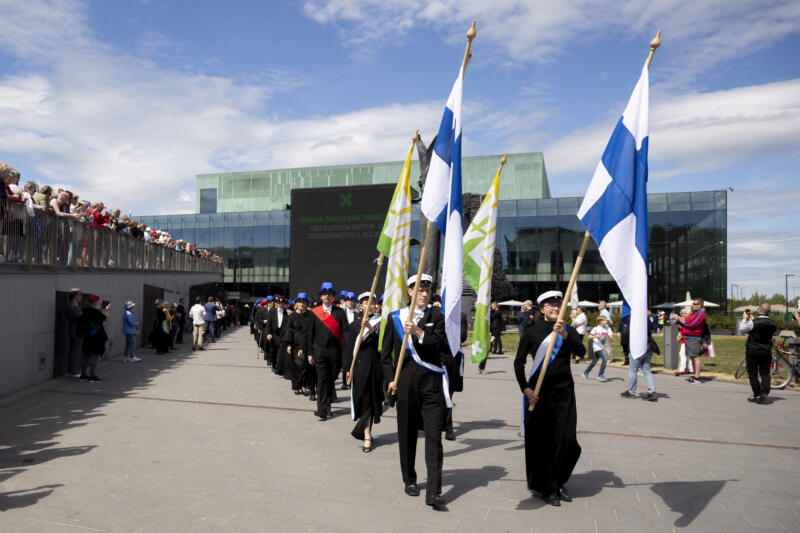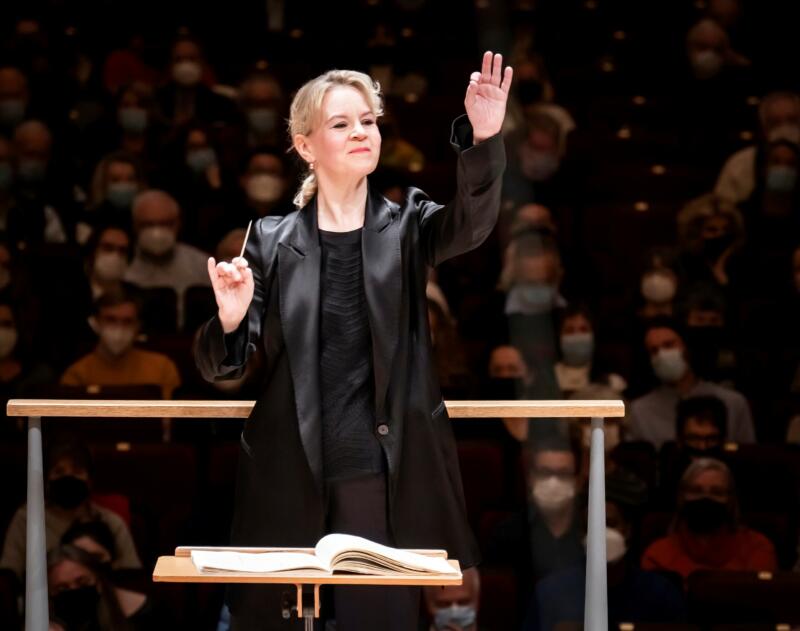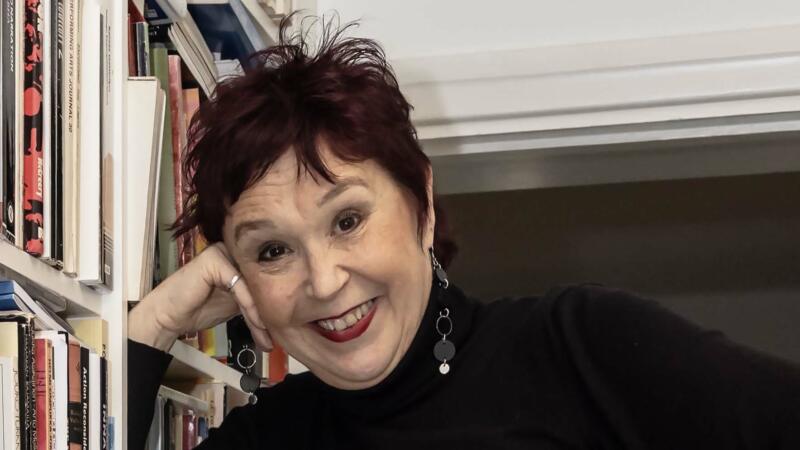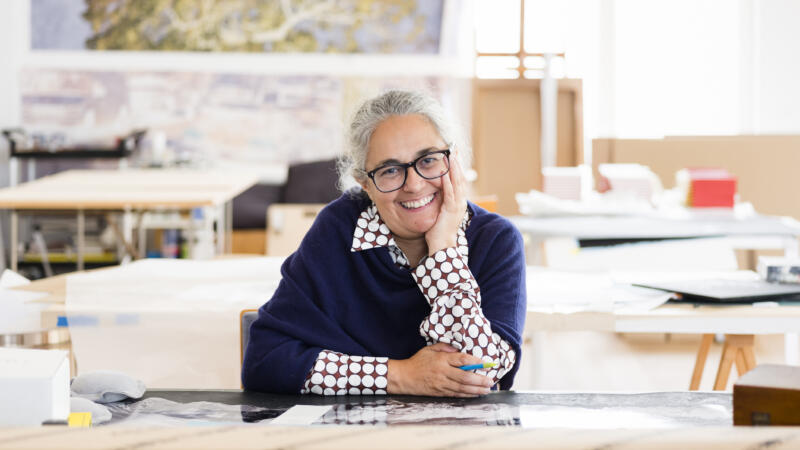Honorary doctor Lia Rodrigues: Privilege comes with a responsibility to uplift others
Dancer and choreographer Lia Rodrigues is one of the recipients of Uniarts Helsinki’s honorary doctorates. The Theatre Academy honours her work that makes dance and art more accessible for everyone.
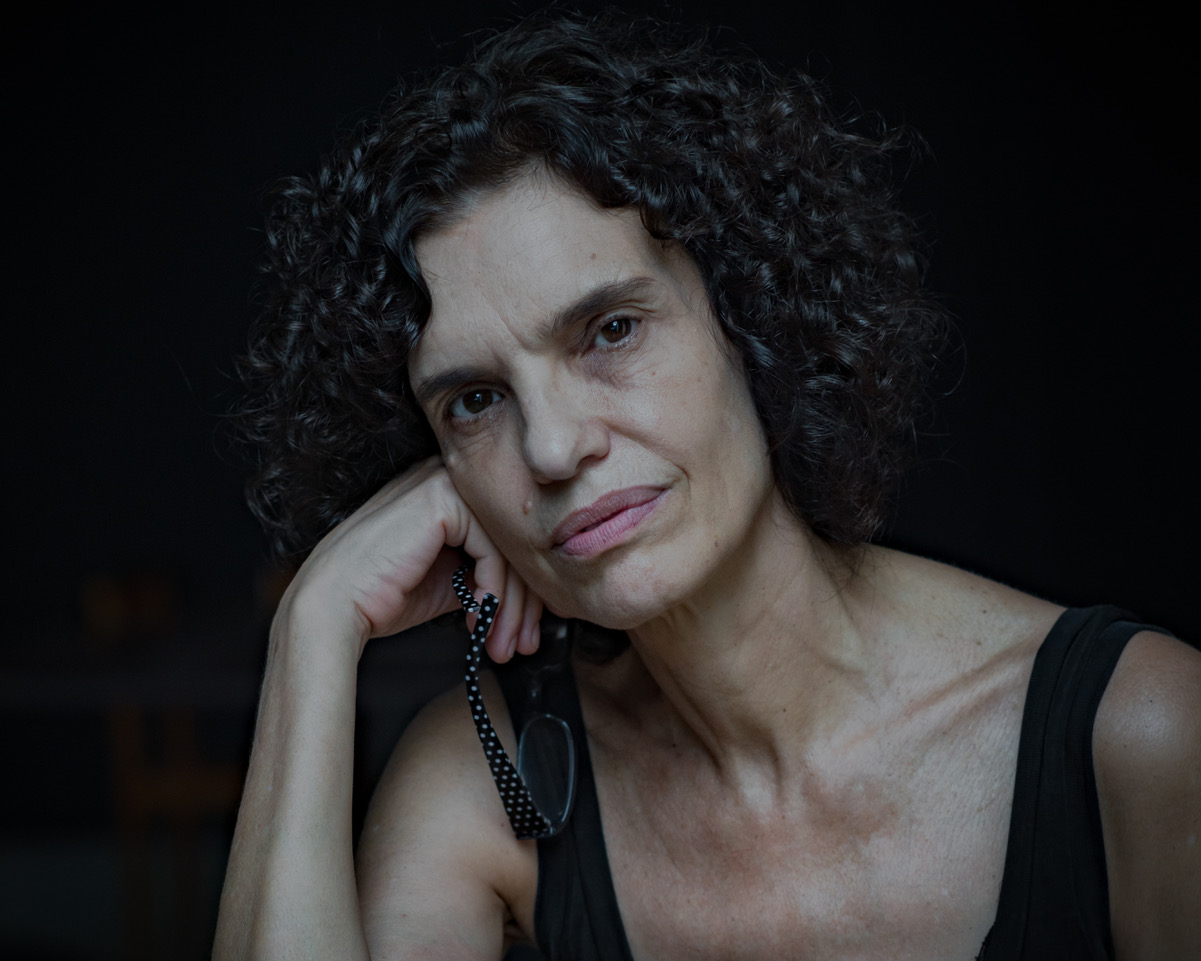
Brazilian Lia Rodrigues (b. 1956) started her long career as a classical ballet dancer. In the early 1980s, she was part of Maguy Marin Dance Company, which is one of the pioneers of contemporary dance in France. In 1990, after returning to Rio de Janeiro, she founded Lia Rodrigues Dance Company. Since 2004, the dance company has been based in Maré, one of the biggest favelas or slums in Rio de Janeiro with about 150 000 inhabitants.
“I was born in Sao Paolo to a middle class white family. I was in a position to choose to dance and make art, and that privilege should turn into responsibilities. I want to offer opportunities to people who cannot make similar choices in their life. My aim is to democratise art and make it available for everyone,” Rodrigues says.
When she started her own dance company, Rodrigues wanted to build her career from a woman’s viewpoint.
“Before I started my company, I had become a mother and that changes everything for a woman. I asked myself, how do you do art when you are a mother. I had to fight for my position. I created the Panorama Festival in 1992 and directed it for 14 years in order to create possibilities for us artists and increase dialogue between us.“
The Panorama Festival has become one of the most influential art festivals in Brazil.
Dance company, art centre and dance school in a favela
Fifteen years ago, in cooperation with the NGO Redes da Maré, Rodrigues founded the Centro de Artes da Maré art centre in the favela Maré. Two years later, they started the Escola livre de Danças da Maré dance school that operates at the art centre side by side with the Lia Rodrigues Dance Company. All the dance company’s premieres are at the art centre and, every time, there are about 300 local people and people from all parts of Rio de Janeiro in the audience.
“Our dance school has over 300 students who live in the Maré favela. Everything we offer them is free of charge. The youngest students are eight years old and the oldest eighty. We teach all dance forms from hip-hop to ballet and we want our students to find their own way of moving and dancing. There is one group of about 20 students aiming to become professional dancers and all of them get grants from us thanks to our partnership with Fondation d’entreprise Hermès,” Rodrigues says.
Despite the possibilities that her dance school, art centre, and dance company offer people in the Maré favela, she does not believe that art can change society.
“I am concerned about various social issues, but art should not be responsible for changing society. This is the responsibility of the entire society and especially the government. Nevertheless, opening the art centre and making art together give the people who live in Maré more options to choose from and access to art. We offer to our dance school students classes about their roles as citizens in the society and issues of gender and racism, for example,” Rodrigues says.
She believes that all our actions are political.
“In my actions as an artist and as a citizen I try to balance utopia and pragmatism. The projects I have been developing in the Maré favela, in partnership with Redes da Maré since 2004, are an integral part of my work, my thinking, and my activism. They transform me as a person, as an artist, and as a citizen. That is what makes political sense to me. I find people and projects there that give me hope, but combative hope. Every day, I learn ways of creating, organising, and resisting.”
Lia Rodrigues Dance Company tours around the world
Today, Rodrigues lives in Rio de Janeiro, but she teaches all over the world and her dance company tours internationally. They have performed at some of the most prestigious festivals in Europe, for example, in the Paris festival d’automne, the Kunsten Festival des Arts in Brussels, and the Venice Biennal.
“Rio is the base of my artistic work, but we need to tour internationally because we survive on tour money. I don’t dance myself anymore, but I create the choreographies for the company.”
Last year, the Lia Rodrigues Dance Company did a European tour with her latest choreography called Encantado.
“In Encantado, I try to find out how to enchant the world into a utopia where there is no difference between human and non-human. With today’s environmental challenges, we all need to think about the environment while taking into account inequality and privilege. ‘Ecology without social justice is gardening’, said Chico Mendes, a Brazilian labour leader, socialist and environmentalist, killed in 1988. The wisdom of the indigenous people has always been the most precious knowledge on earth. We have to listen. Their voices and lives are being exterminated. Let’s finally open our minds and practise radical listening,” Rodrigues says.
Art pedagogy is becoming more inclusive
Rodrigues has followed dance education already for 50 years. She mentions that the Brazilian pedagogue Paulo Freire has influenced her methodology. Freire is best known for his book Pedagogy of the Oppressed (1968), where he states that pedagogy should treat the learner as a co-creator of knowledge.
“In my dance company, dancing together is a way of teaching. It takes about nine months to make a performance, and we learn from each other and improve ourselves through cooperation,” Rodrigues says.
She does not lecture often, but she organises workshops. This year, Rodrigues has received a grant to teach choreography at the Freie Universität in Berlin. When she teaches at the university, they sit in a circle with a group of students and have conversations.
“Every session is a little different and sometimes we do some exercises as well. We make democratic group decisions about choreography problems. We discuss theoretical topics together and it increases our understanding of the topic and each other.”
Rodrigues thinks that art education has become more inclusive during her career. Identity and gender issues are now taken into consideration, and that change is very welcome to her.
“I have introduced radical listening to my work. We need to listen to transsexual and non-binary individuals and learn from them. We need to learn from other people’s experiences, include others and accept them,” Rodrigues says.
Similarities with the Theatre Academy’s pedagogical methods
Rodrigues has never been to Finland or had any connection to Uniarts Helsinki, and she was very surprised and honoured to be acknowledged this way by the Theatre Academy.
“When I was young, I studied history at the University of Sao Paolo, and I am so happy suddenly, late in my life, to get this honorary doctorate. I read about Uniarts Helsinki and I found out that our approaches to pedagogy have a lot in common. They also want to make art more inclusive and see the importance of art in the world,” Rodrigues says.
Finland and Brazil are very different to each other in size, population, and level of equality.
“Uniarts Helsinki has amazing resources compared to our dance school in the favela. However, our differences bring us together. We should learn from each other and exchange ideas,” Rodrigues says.
Text: Päivi Brink
Uniarts Helsinki conferment event, the ceremonial conclusion of university studies, will be held in Helsinki from 16 to 18 August 2024. The ceremony will feature the conferment of degrees on master’s graduates and doctors from the university’s academies. Additionally, honorary doctorates will be conferred on eight individuals who represent Finnish or international pioneers and influential figures in their fields and who have advocated for arts education or advanced the societal role and significance of the arts.
The honorary doctors have been selected by the boards of the Academy of Fine Arts, Sibelius Academy and Theatre Academy and the board of the University of the Arts Helsinki. Being conferred an honorary doctorate is the highest recognition bestowed by the university.
